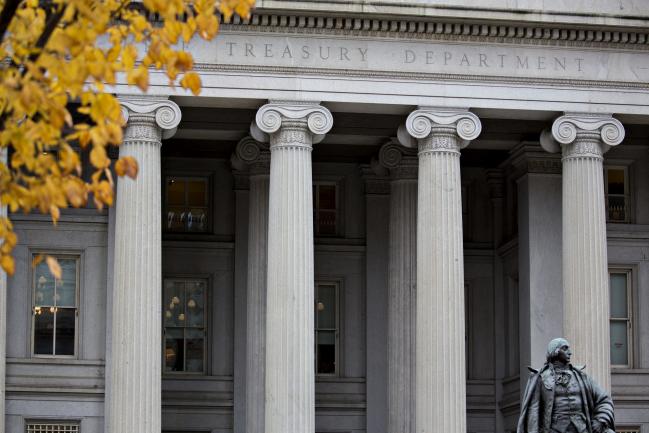(Bloomberg) -- The U.S. Treasury Department will lift longer-term debt issuance to $66 billion, marking the first boost since 2009 amid expectations of growing deficits and the Federal Reserve balance-sheet roll-off.
Treasury Secretary Steven Mnuchin’s debt management team will sell next week $26 billion of 3-year notes versus $24 billion in November, it said Wednesday in its refunding announcement. The department also lifted to $24 billion the sale of 10-year notes from $23 billion and the 30-year bonds to $16 billion from $15 billion, also to be auctioned next week. Total offering rose to $66 billion from $62 billion in November.
Treasury also said it expects to lift sales of 2- and 3-year note auctions by $2 billion per month over the quarter. It will also boost 5-, 7- and 10-year notes and 30-year bond auction by $1 billion each month starting in February. Sale of 2-year floating-rate notes will also be increased by $2 billion beginning next month. Additional borrowing needs will be addressed by increasing bill sales.
Total adjustment will amount to $42 billion of new issuance for the upcoming quarter. Auctions sizes of Treasury Inflation Protected Securities will remain unchanged over the three-month period.
‘Borrowing Need’
“Treasury anticipates these changes will stabilize the weighted-average maturity (WAM) of the debt outstanding at or around current levels, notwithstanding large, unexpected changes to borrowing need,” Treasury said in the statement.
Before Wednesday’s refunding announcement, most primary dealers indicated they expect Treasury would boost some coupon-bearing debt auction sizes in what was seen as an inflection point to rising issuance that will ultimately spread to all tenors. Dealers forecast new issuance in 2018 to at least double this year to more than $1 trillion, the most since 2010.
The department discussed its investigation on the topic of Treasury trading data -- which is now being used only by regulators -- being released to the public.
“Treasury is actively considering a policy on the public dissemination of Treasury securities transactions data,” the department said in their statement. “Treasury officials are currently seeking input from a wide range of market participants and other stakeholders.”
Bill Sales
A big chunk of the new supply over the year will also come through more bill sales, yet that maybe temporarily stymied as Treasury waits for lawmakers to hoist or suspend the debt limit again. Mnuchin said Tuesday that extraordinary measures he’s been using to stay under the suspension -- that expired on Dec. 8 -- will last through the end of February. The Treasury statement reiterated the end-February date as well.
The U.S. posted its largest budget deficit since 2013 in the fiscal year that ended in September. While President Donald Trump’s administration says the tax bill will stimulate enough economic growth to cover lost revenue, Congress’s tax scorekeeper estimates the changes will raise deficits by more than $1 trillion over the next decade.
Treasury said over the next three months it plans to issue a call for a large-position report, without disclosing any more details. The last time the department conducted such a request for details on the positioning of market participants was in June 2016.
(Updates with comments on trading data in seventh paragraph.)
